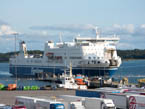Overview of Maritime Operations: A Comprehensive Guide
Maritime operations play a crucial role in global trade and logistics. These operations involve the planning, execution, and monitoring of the movement of goods by sea, ensuring efficient and timely delivery of products and services. The process of maritime operations is complex and requires expertise in logistics, risk management, and technology. Below, we will explore the key components involved in maritime operations.
1. Arranging Transport Plans
One of the primary tasks in maritime operations is arranging transport plans. This involves coordinating with various stakeholders, including shipping companies, ports, and cargo owners, to ensure that goods are loaded and transported efficiently. Accurate documentation, such as bills of lading and manifests, is essential to streamline the process and avoid delays.
2. Processing Cargo Documents
Processing cargo documents is a critical step in maritime operations. This includes preparing and verifying all necessary paperwork, such as bills of lading, shipping manifests, and customs declarations. Ensuring that all documentation is accurate and complete helps prevent issues during transit and facilitates smooth customs clearance.
3. Monitoring Cargo Movement
Monitoring the movement of cargo is another key aspect of maritime operations. This involves keeping track of the vessel's route, status, and potential delays. Real-time tracking tools and systems allow for better coordination and decision-making, ensuring that goods reach their destination on time.
4. Risk Management
Risk management is a vital component of maritime operations. This involves identifying potential risks, such as weather conditions, port congestion, and customs issues, and implementing measures to mitigate them. For example, diversifying shipping routes or maintaining strong communication with stakeholders can help reduce the impact of unexpected disruptions.
5. Goods Tracking
Goods tracking is an essential part of maritime operations. This involves using tracking systems and tools to monitor the entire journey of goods from the source to the destination. Accurate tracking helps ensure transparency, accountability, and efficient delivery, which are critical for maintaining customer trust and satisfaction.
Conclusion
Maritime operations are a vital link in the global supply chain, enabling the seamless movement of goods across the world. By understanding the key components involved in these operations, businesses can optimize their processes, reduce costs, and improve efficiency. Whether you're a logistics professional or a business owner, staying informed about maritime operations can help you navigate the complexities of global trade and logistics with confidence.
